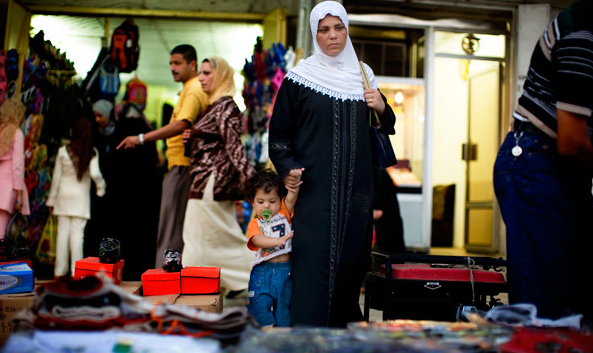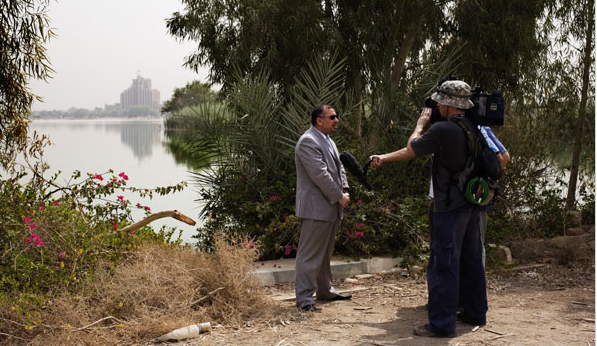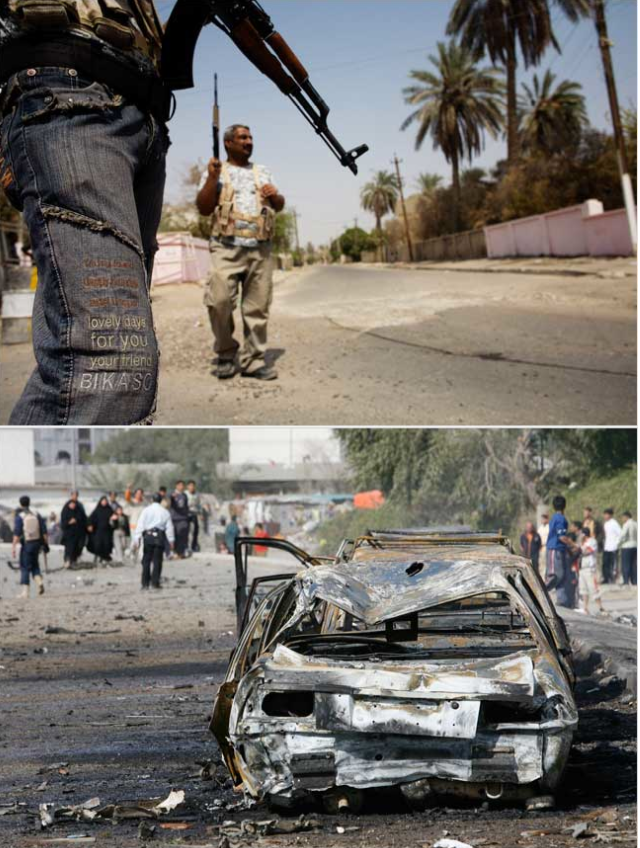It is hard to find much to smile about in the news these days what with the U.S. economy in the toilet, sectarian conflicts erupting throughout the world, and nature following its own rhythms and paths to devastating destruction. And so when I saw this picture featured front and center on the NYT website yesterday with the headline “A Vision of Tourist Bliss in Baghdad’s Rubble” I broke out in laughter –and then I double-checked the URL to make sure I hadn’t inadvertently clicked on the website for The Onion.
The man we are looking at is Humoud Yakobi, the head of Iraq’s Board of Tourism, who is looking to convert a small, bombed out island in the Tigris River and within sight of the Green Zone into a fantasy island getaway that would include a “six star” hotel, an amusement park, and luxury villas “built in the architectural style of the Ottoman Empire-era buildings in Old Baghdad.” It would be topped off with – and I kid you not – the “Tigris Woods Golf and Country Club.” The only thing missing, it would seem, is Ricardo Montalban’s “Mr. Roarke” and his sidekick Tattoo. The problem, it seems, is not only finding financial backers to fund the 4.5 billion dollars to underwrite the enterprise, but reckoning with the fact that the target audience—Western tourists—tend to be “sensitive to bombings and things like that” (at least in the opinion of the head of the media relations department of Iraq’s tourism board).
The return to normalcy will surely require venture capitalists willing to take risks on Baghdad’s future and so perhaps we should not be overly cynical here. And yet it is hard to be anything but cynical when the NYT’s “Week in Review” features another story that presumes to underscore the first stages of the return to “calm” and “normal” with a photograph of a mother and child walking about safely in a mixed Sunni-Shiite neighborhood:

Of course, one cannot look beyond the edges of the photographic frame, and so it is impossible to see what, if anything, enables or secures the apparent calm and safety. And as if to acknowledge this absence the NYT slips in two small clickable photographs sutured together in a sidebar labeled “Street Scenes”:
It is important, I think, that the two images function as a vertical diptych, forcing the viewer to take them in seriatum as part of a coherent narrative. The top photograph, the caption tells us, shows members of the “Awakening Council” controlling a local “checkpoint.” The bottom photograph is a car bombing from “early 2007” and is captioned as a once “frequent” scene. The implication then is that the only thing that stands between the bombed out cars and the scene of relative calm in the Sunni-Shiite neighborhood are these local militias.
This logic of the visual narrative is impeccable and if we stop here we might be inclined to read the story as designed to animate support for U.S. policy and the Bush administration’s Pollyanna conclusion that “the surge” has helped Iraq recover its middle American, Main Street calm. But I think another possibility has to be considered. For surely one implication of the visual logic has to be that just as one needs to look outside of the frame of the first photograph to discover what might be supporting the relative calm, one needs equally to look outside of the diptych to discover what supports the Awakening Councils—which are, after all, groups of former Sunni insurgents funded as mercenaries by the U.S. government as part of a “hearts and minds” campaign –and to wonder what will happen when that support dissipates.
The answer to this question is by no means clear, but given the history of this region one has to assume on par that the return to sectarian violence is a very real likelihood. And so we come back to the article that reports Hamoud Yakobi’s plans to build a luxury, tourist retreat on an island in the Tigris River. It really is an absurd fantasy, but then again perhaps no more absurd or fantastic than portraying a neighborhood controlled by former insurgents hired as mercenaries by a foreign and occupying government as somehow a return to normalcy. And maybe that was the point all along.
Photo Credits: Max Becherer/Polaris and New York Times; Ali Jasim/Reuters.


Whats really strange about the second photograph is the stenciling on the jeans of the militia member — its the compositional center of the picture, the place where the focus and lighting conspire to bring our eyes. What’s written on his leg? “lovely day / for you / your friend / BIKASO” When plain clothes militiamen walk the streets with AK-47s (I don’t actually know that this is the gun in question, but you get the point), is this really a lovely day for Iraq? Otherwise, I think that Lucaites is spot on — the fantasy that this is really a lovely day for Iraq, a prime opportunity for tourism (or for taking your little girl to market). The only other speculation I’ll add, this one a little more out there, would be to point out the punctum of the photo – 3 illegible red lines directly above the writing, the illegibility of which gives the lie to the “legible” words below. I don’t know if we want to read the color red for its potential reference to blood or aggression, or the message that daily life is still overshadowed by terror EVEN IF violence is down, but the repeated, rhythmic red lines seem to me a kind of subliminal mantra warning us against administration claims that Iraq has “lovely days.”
This photographer really knows how to deliver a message with “no caption needed.”
PW — Thanks. I too saw the writing on the pants and had a paragraph on that but the post was getting too long. But I think you are right. It really calls attention to the irony of normalcy in multiple registers. It is also noteworthy that the first picture and the diptych are both by Max Becherer.
Sydney Morning Herald : “Chorus of failure grows ever louder over Afghanistan” :
“The perception of the threat from the Taliban continues to outstrip reality,” Brigadier Mark Carleton-Smith told The Times last week. “This struggle is more down to the credibility of the Afghan Government rather than the threat from the Taliban.”
“The security situation is getting worse. So is corruption and the [Afghan] Government has lost all trust. [The insurgency], while incapable of winning a military victory, nevertheless has the capacity to make life increasingly difficult, including in the capital.
“The presence – especially the military presence – of the coalition is part of the problem, not the solution. The foreign forces are ensuring the survival of a regime that would collapse without them. In doing so, they are slowing down and complicating an eventual exit from the crisis.”
DYSTOPIAN REALITY. . .the State, without the freedom to fail becomes a dysfunctional stasis of forces.
Zamir Kabulov, the Russian ambassador to Kabul, has lectured Washington that it is repeating the mistakes made by Moscow during its 1980s occupation of Afghanistan, when it “believed that control of [the Capital city] and the provincial centres equated with control of an essentially rural population.”
UTOPIAN FUTILITY. . .the persistence, or by force insistence of an unrealizable notion of nation ‘State’.
“More and more the American effort in Afghanistan resembles the Vietnam War – with its emphasis on body counts and air strikes, its cross-border sanctuaries, and its daily tactical victories that never affect the slow and eventual decisive erosion of rural support for the counterinsurgency,” they write.
U.S. Secretary of State Rice : “success in Iraq is “not a sure thing.””
What is interesting about this statement is that it is literally true. And by writing that what i am saying is that “success”, the concept of the word itself ~ remains undefined by the Secretary… or by anyone else, Over There or Over Here, for that matter.
“success” = something we have not yet achieved-?
“success” = something achieved but not enduring-?
“success” = no opposition to Western military occupation & commodity wealth extraction-?
“success” = the U.S. ‘surge’ media metric of no American KIA+WIA, whatsoever-?
“success” = that notion of nation, ‘IRAQ’ incorporates all Shi’ite-, Sunni- and Kurdish-identity peoples ~ as existed before the American invasion; e.g., under the Unitary Executive ruler, Saddam Hussein-?
“success” = a ‘bailout plan’ for the American military… whose most precious assets ~ its assault troops ~ sit now frozen behind the blast-proof walls of their GreenZone and FOB banks; illiquid: incapable of being deployed (or even withdrawn) without casualty=”failure” ~ yet day-by-day losing “value”, just sitting there in this hideous, daily drip, drip attrition, this Stasis Of Forces-?
indeed: “success”, quite literally ~ is not a sure thing, yet, is it?
ref : “When they talk about bringing our troops home are they talking about troops that are actively engaged in combat, or are they talking about all the troops?”
fwiw, The Conversation one hears today on “Main Street” America is more likely expressed not in terms of “bringing our troops home,” but as “bringing our money home.” Though at first blush you folks, Over There may think this thinking callous, i would remind you that we, Over Here are an unabashed Democratic Capitalist culture; e.g., “Monopoly” is, for us a children’s board game; and competition is here encouraged as benefit, rather than suppressed as being an un-natural detriment to our social order. Knowing that this is our nurture, perhaps helps to explain our nature.
‘A Military Victory’, whenver this is our challenge was, and remains today not only realized, but expected. But, ‘An American Victory’ means something (to many Americans) altogether different. ie., Perhaps something more like the successful conversion of a Cost Centre to a Profit Centre. In that regard, imho: Americans have this interesting way of making a distinction between ‘The Victories’ of our military Ventures, while acknowledging ‘The Failures’ of these Enterprises being our American endeavours.
imho, The irony of our (postwar, military) history is that, soon after we “bring the troops home,” the occupied territories then tend to flourish as self-organizing, capitalist ‘States’ : Being no longer patronized, infantilized, struggling under some illusion of Western, utopian idealism, (which, after all even WE could not achieve 🙂 they do not devolve into dystopian chaos (for long, for this cannot be sustained, either), to become capable trading partners. We Americans learn the same hard history lesson, over and over: in the Ending it is not our Victory, or our Enterprise, but theirs.